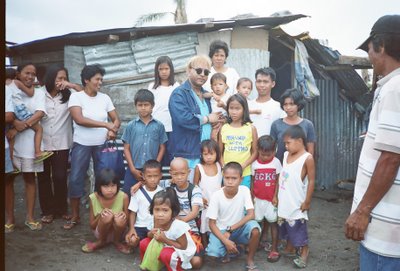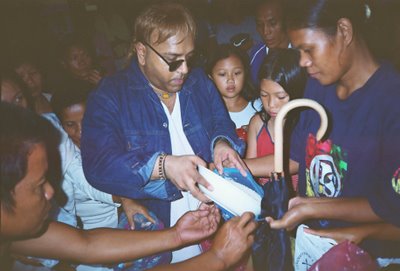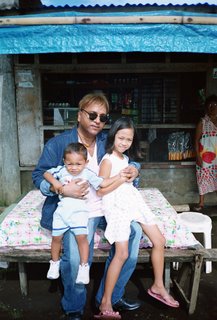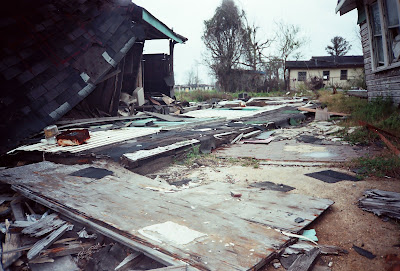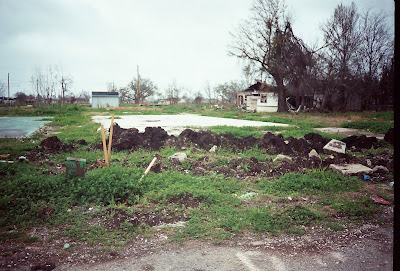
Gulf Today
Oct 23, 2009
by Manjula Ramakrishnan
NEED OF THE HOUR
It was Nature's fury, unleashing terror of an extraordinary kind. By the time the floods let up a wee bit, it had poured an entire month's rain in 6 hours, flooding entire towns and cities of Philippines. These were unprecedented floods that swept away anything, that was unfortunate enough to be in its raging path, submerging houses, leaving the hapless population without food, water and shelter.
Sept. 26, 2009 is a day the people of Philippines will find it hard to erase from their memory. People scaled rooftops, waiting to be rescued. Women huddled up together on top of houses, watching the rising water level with abject fear on their faces. Children clung to their mother's bosom with unwavering faith that their parents would protect them. Brave men took their chances and swam against the raging flood, going in search of help for their families. Alas, plenty drowned, even as the storm raged relentlessly all around. This was the worst typhoon to hit the Philippines and Metro Manila since the last four decades.
And when Typhoon Ondoy - known as Ketsana internationally was done with the death and destruction, entire towns had gone under water, the remaining were under the daily danger of landslides. Cars were turned upside down; roads were covered covered in thick mud and debris. The typhoon hit a total of 25 provinces with over half a million people affected and still with no means of surfacing up and rebuilding their lives.
The government was quick to step in, with army troops, police and civilian volunteers rescuing victims and trying hard to clear up the debris, in order to bring some semblance of normalcy. Glenn Perry from the UAE, who quickly reached the shores of Philippines to offer help, gives a first-hand account of the tragedy.
"Heart wrenching cries of 'help me, please help me' were filling the sombre atmosphere. The flood victims were weeping, saying they couldn't bear to see their children hungry. Whenever I distribute food, the victims jumped on me, snatching food from my hand, so desperate was their situation. What would start as a group of hundred people, would soon swell, with a thousand people swarming around me, their eyes beseeching me for more food. Images of those grief-stricken faces will haunt me for a long time to come."
This is also why Perry has started the Charity Food Drive in aid of the flood victims and the thousands who are living in evacuation centres. The need of the hour is essentials such as easy-to-cook meats, soups, instant noodles, rice, soaps, vitamins and similar. Mothers are in dire need of milk and biscuits for their babies. Donation boxes are therefore, set up for food and other essentials to be dropped off at the Dubai Music School, located on Zabeel Road in Dubai.
During his first visit to the affected areas, Perry distributed rice, milk, canned meats, sardines, sugar, bath soap, detergent, toothpaste, coffee, nutrition biscuits, corn, water, juices, bread, instant noodles and similar contributions from generous individuals and similar contributions from generous individuals will take care of at least their bare minimum needs.
"I implore the Dubai community to step forward and assist me in helping those poor souls. Even if you donate just a can of food, that would go a long way at such trying times. Food brought in as part of the Food Drive will help to replenish the pantries of those most in need. With the onset of tough economic times, people during normal days have been struggling to bring food on to the table for their families. The flood disaster has multiplied the woes faced by the Filipinos. I am hoping the altruistic UAE residents will open their hearts and generously help those in need."
The floods devastated 25 provinces of the Philippines. The capital Manila and Rizal were badly affected. The water levels rose as high as 20 feet. Thousands of houses were destroyed. Fridges, refrigerators, washing machines were seen floating in the flooded houses. About 2.7 billion pesos in infrastructure - roads, bridges and schools - were also damaged.
"We have absolutely nothing and need to rebuild our lives from scratch," mourned Marino, a 42 year old resident of Pasiq. His house was completely submerged in the waters with all his life's belongings. Paddy fields in Tanay have been destroyed; farmers are therefore without an income. A musician like me was emotional about his prized piano that was floating in the floods. He had thus also lost his means to earn a living. Emanuale, an artist from the Rizal province, who had spent happy moments planning his art exhibition, lost all his paintings. Ricky was shattered having lost both his grandmother and his son in Marikina. "We had very little to live on before, but now we do not have anything," lamented a woman in her late fifties. Children were seen wandering the streets aimlessly, minus their families washed away by the floods."
"Amidst the pitiful whimpering of hungry babies, parents wait eagerly by the main road, praying for someone to arrive with relief goods. They are truly a population in need of help from the of the world community," sums up Glenn Perry.

